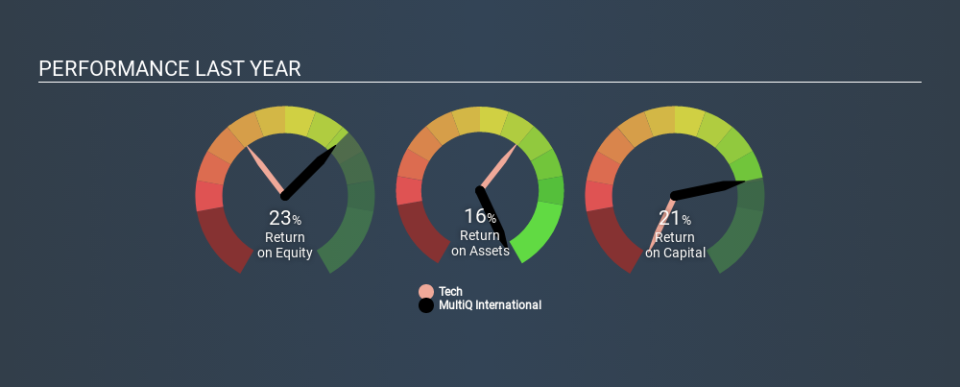Here's What MultiQ International AB (publ)'s (STO:MULQ) ROCE Can Tell Us

Today we'll look at MultiQ International AB (publ) (STO:MULQ) and reflect on its potential as an investment. Specifically, we'll consider its Return On Capital Employed (ROCE), since that will give us an insight into how efficiently the business can generate profits from the capital it requires.
First of all, we'll work out how to calculate ROCE. Second, we'll look at its ROCE compared to similar companies. Finally, we'll look at how its current liabilities affect its ROCE.
Return On Capital Employed (ROCE): What is it?
ROCE is a measure of a company's yearly pre-tax profit (its return), relative to the capital employed in the business. All else being equal, a better business will have a higher ROCE. Ultimately, it is a useful but imperfect metric. Author Edwin Whiting says to be careful when comparing the ROCE of different businesses, since 'No two businesses are exactly alike.
So, How Do We Calculate ROCE?
Analysts use this formula to calculate return on capital employed:
Return on Capital Employed = Earnings Before Interest and Tax (EBIT) ÷ (Total Assets - Current Liabilities)
Or for MultiQ International:
0.21 = kr22m ÷ (kr147m - kr45m) (Based on the trailing twelve months to December 2019.)
So, MultiQ International has an ROCE of 21%.
View our latest analysis for MultiQ International
Is MultiQ International's ROCE Good?
ROCE can be useful when making comparisons, such as between similar companies. MultiQ International's ROCE appears to be substantially greater than the 12% average in the Tech industry. We consider this a positive sign, because it suggests it uses capital more efficiently than similar companies. Putting aside its position relative to its industry for now, in absolute terms, MultiQ International's ROCE is currently very good.
MultiQ International reported an ROCE of 21% -- better than 3 years ago, when the company didn't make a profit. This makes us wonder if the company is improving. You can see in the image below how MultiQ International's ROCE compares to its industry. Click to see more on past growth.
It is important to remember that ROCE shows past performance, and is not necessarily predictive. ROCE can be deceptive for cyclical businesses, as returns can look incredible in boom times, and terribly low in downturns. ROCE is, after all, simply a snap shot of a single year. How cyclical is MultiQ International? You can see for yourself by looking at this free graph of past earnings, revenue and cash flow.
Do MultiQ International's Current Liabilities Skew Its ROCE?
Short term (or current) liabilities, are things like supplier invoices, overdrafts, or tax bills that need to be paid within 12 months. The ROCE equation subtracts current liabilities from capital employed, so a company with a lot of current liabilities appears to have less capital employed, and a higher ROCE than otherwise. To check the impact of this, we calculate if a company has high current liabilities relative to its total assets.
MultiQ International has current liabilities of kr45m and total assets of kr147m. Therefore its current liabilities are equivalent to approximately 31% of its total assets. MultiQ International has a medium level of current liabilities, boosting its ROCE somewhat.
What We Can Learn From MultiQ International's ROCE
Even so, it has a great ROCE, and could be an attractive prospect for further research. MultiQ International shapes up well under this analysis, but it is far from the only business delivering excellent numbers . You might also want to check this free collection of companies delivering excellent earnings growth.
If you are like me, then you will not want to miss this free list of growing companies that insiders are buying.
If you spot an error that warrants correction, please contact the editor at editorial-team@simplywallst.com. This article by Simply Wall St is general in nature. It does not constitute a recommendation to buy or sell any stock, and does not take account of your objectives, or your financial situation. Simply Wall St has no position in the stocks mentioned.
We aim to bring you long-term focused research analysis driven by fundamental data. Note that our analysis may not factor in the latest price-sensitive company announcements or qualitative material. Thank you for reading.

